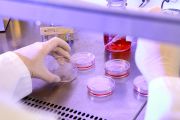Research programme
Heart failure is a leading cause of cardiovascular morbidity and mortality. Despite a wealth of knowledge about molecular alterations in heart failure, there is a vital lack of understanding about early molecular mechanisms governing the transition to overt heart failure.
Specific and highly localized changes in redox signalling and phosphorylation of the proteome are critically involved in changing the function of cardiac cells and contribute both to muscle-dependent pump failure and/or electrical changes predisposing to arrhythmias.
Although redox- and phosphorylation changes have been described in different heart diseases for decades, unfortunately this has not resulted in therapeutic consequences such as therapeutic targeting of select mechanisms by pharmacological compounds.
The missing informations towards this critical transition, which will be addressed within the International Research Training Group, are the
- up to date global and quantitative phospho-proteome and redox-proteome analyses in stage-specific and particularly in early heart failure samples,
- the identification of the specifically involved enzymes as well as their cell-specific or compartment-specific function,
- the crosstalks between redox and phosphorylation changes,
- integration of the novel findings into more complex physiological and pathological settings and
- identification of putative therapeutic target molecules.


